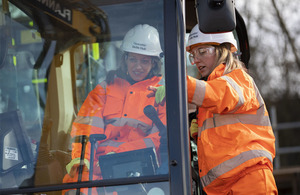Treasury Minister sees how Midlands skills hub is building the future with apprenticeships
An innovative training hub in the Midlands that is inspiring young people to start a new career in construction welcomed the Exchequer Secretary today (10 February) when she visited the region.

-
Exchequer Secretary Helen Whately tours innovative training hub in Birmingham to mark 15th National Apprenticeship Week
-
Minister meets apprentices learning skills for future infrastructure projects including HS2 and Crossrail
-
Follows announcement that up to 1,500 apprentices are to be recruited on flexi-job apprenticeship scheme, boosting recruitment in key sectors
To coincide with National Apprenticeship Week, Helen Whately toured the Balfour Beatty Flannery Operator Skills Hub in Birmingham where she met some apprentices and discussed how they were benefiting from the training opportunities.
The Minister also had some practical experience of her own, trying out one of the state-of-the-art training simulators and tested her skills on a digger.
The purpose-built facility, which opened a year ago, offers innovative programmes to train people to work on major infrastructure projects such as HS2 and Crossrail.
It comes as the Government announces up to 1,500 apprentices are to be recruited on new flexible apprenticeships by 2023, creating opportunities for more people to earn while they learn in industries that boost the economy. The scheme forms part of plans to increase apprenticeship numbers in key sectors such as healthcare, construction, and the creative industries, with the BBC and NHS among employers awarded a share of almost £5 million to support the drive.
Following her visit, Exchequer Secretary Helen Whately said:
Our Plan for Jobs is giving people the skills they need to find work and build careers and apprenticeships are a great way to gain qualifications while working and earning.
It’s been fantastic to see for myself how the Balfour Beatty Flannery skills hub is training up the next generation in the construction industry. Their innovative approach means they are training up apprentices with the technical skills they’ll need on modern construction sites and building on the job experience.
It’s great to see them attracting women into the construction industry too. As I saw for myself, operating a digger can be women’s work just as much as it is men’s.
Andy Ormerod, Managing Director of Balfour Beatty’s Plant and Fleet Services business, said:
The Operator Skills Hub is truly one-of-a-kind; a state-of-the-art facility that not only harnesses the spirit of collaboration but embodies Balfour Beatty’s commitment to develop our own future diverse workforce, and inspire the next generation of highly competent and digitally capable Plant Operators“.
As we celebrate National Apprenticeship Week, it was a pleasure to welcome Helen Whately MP, Exchequer Secretary to the Treasury to the Hub, to see first-hand our pioneering approach to combatting the construction and infrastructure industry’s skills shortage and to showcase the range of exciting opportunities available for young people.
This year, Balfour Beatty is training 50 apprentices through the skills hub, and since opening last year it has had more than 1,000 people receiving upskilling and training in all aspects of safe plant operation and construction skills.
At the Autumn Budget and Spending Review, the Government confirmed the first increase to employer-led apprenticeships funding since 2019-20 – with funding growing to £2.7 billion by 2024-25.
This week marks the 15th National Apprenticeship Week, a national celebration of apprenticeships and the impact they are having on individuals, businesses, and communities up and down the country.
Further information
- Photos are available on the Treasury’s Flickr page
About Balfour Beatty:
-
Balfour Beatty is a leading international infrastructure group with 26,000 employees who finance, develop, build, maintain and operate complex local and national infrastructure projects
-
These projects include road and rail, airports, seaports, tunnels, bridges, health and education facilities, and water, light and power networks